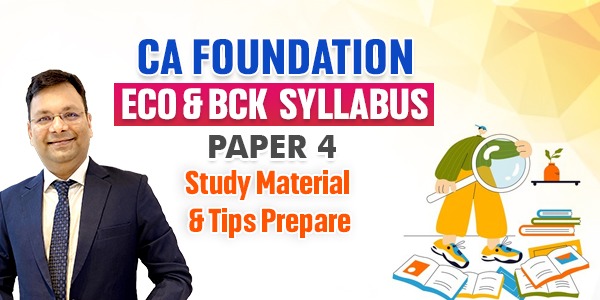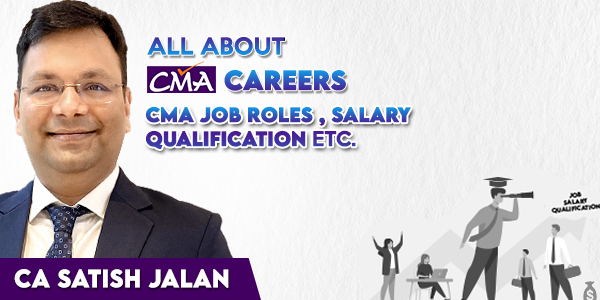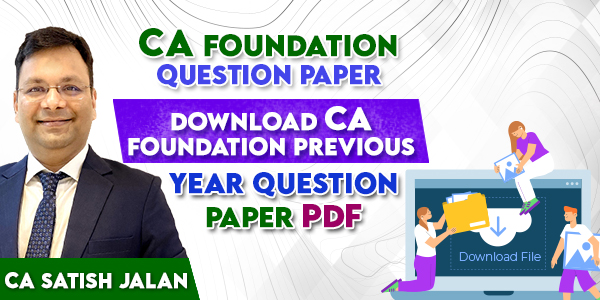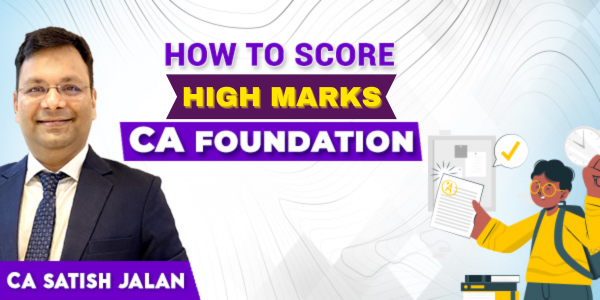11
Oct, 2023
CA Foundation Economics & BCK ( Paper 4) : Syllabus, Marks Distribution & Tips to prepare.
-
CA Foundation, CA, CA Student
CA Satish Jalan
Economics is a subject that focuses on the skills and abilities of individuals in the market as consumers or producers and deals with finding answers to their difficulties. Economics is the fourth paper in the CA Foundation. the paper has two sections: Business Economics and Business Commercial Knowledge.
This blog will help you to go through the CA Foundation Economics and BCK syllabus, mark distribution, how to prepare for the exam and how students should attend the CA Foundation Economics Paper.
|
Table of Contents |
What is the Structure of the CA Foundation Economics paper?
Paper 4 of the CA Foundation Course is divided into two parts:
Business Economics and Business Commercial Knowledge (BCK)
-
Business Economics is of 60 marks, while BCK is of 40 marks.
-
This paper is completely objective in nature and comprises 100 multiple-choice questions, each of one mark.
-
Candidates have a time limit of two hours to finish the paper. It is important to note that for each incorrect response, 0. 25 are deducted as negative markings.
CA Foundation Economics & BCK Syllabus and Marks Distribution
CA Foundation Economic Syllabus & Marks Distribution
CA Foundation BCK Syllabus & Marks Distribution
Download the Study material of the CA Foundation Eco Chapter wise here
Download the Study material of the CA Foundation BCK Chapter wise here
How to study CA Foundation Economics & BCK Paper?
The First Stage is an In-depth Conceptual Study (7 to 8 days):
Allow 7 to 8 days at the start of your CA Foundation Economics preparation for a thorough study of every concept covered. The key to success in this paper is strong conceptual knowledge. Read through all of the chapters of both Economics and Business and Commercial Knowledge (BCK), making the effort to highlight important concepts. Make a list of important things to remember, as these may appear as multiple-choice questions (MCQs) on the exam. After finishing a chapter, immediately solve the MCQs in the ICAI module or your chosen study materials. To strengthen your understanding, review your study material on a regular basis and practise various sorts of MCQs.
2nd Stage - Summarised Syllabus Review (4 - 5 days):
The next phase, which should last roughly 4 to 5 days, will concentrate on a summarised version of the syllabus. Continue to review the syllabus and your notes. Continue answering multiple-choice questions. Aim to complete the entire ICAI module at least twice and look into other resources such as MTPs.
3rd Stage - Quick Revision (1 to 1.5 days):
As the exam date gets closer, set aside 1 to 1.5 days for a fast revision to streamline your pre-exam study time. Reread the notes and answer a few questions from each chapter. Consider taking a mock exam, preferably two if possible, to recreate exam conditions and identify any weak areas that may require additional focus.
In Which Order Should We Study for CA Foundation Economics & BCK Paper?
When preparing for the CA Foundation exams, it is important to have a well-structured plan for studying the syllabus. The syllabus for these exams can be rather vast, therefore ad hoc or selective studying should be avoided. Instead, use a logical and complete approach to ensure you fully comprehend all of the principles.
One approach to learning the course is to begin with Economics. Economics has an important weightage in the exam, making it a reasonable place to start. Furthermore, around 50% of the Economics syllabus overlaps with the syllabus covered in Std. 12, so you may already be familiar with these topics. Begin by delving into Economics, focusing on getting a thorough understanding of its fundamental ideas.
After you've built a solid foundation in Economics, you can move on to Business and Commercial Knowledge. This is a newer topic that may be more theoretical in nature. It is important to read and study its material multiple times in order to remember the keywords and concepts. This systematic strategy will assist you in dealing with the subject efficiently.
It is important to follow the "Remember, Revise, Recollect" strategy throughout your study preparation. Returning to and reviewing previously covered topics on a regular basis will reinforce your understanding and recall of the material. Remember that questions from each chapter are likely to appear on the exam, thus addressing all chapters equally is essential.
How Do You Solve Multiple-Choice Questions?
-
One of the most important requirements for success in any MCQ exam is time management. Plan how much time you want to spend on each part ahead of time and practise accordingly when answering questions at home.
-
The answer should be circled on an OMR Sheet. To increase familiarity, write all mock tests on OMR sheets.
-
Use the same calculator that you will use in the exam right away. Complete acquaintance with the calculator and its different shortcuts is required.
-
If you are unable to solve a certain question within the allotted time, proceed to the next question.
-
If the calculation for a numerical question seems excessively long, one simple solution is to put the options back into the questions and see if the equation balances.
-
Units and measurements frequently provide vital details. For example, if calculating area, eliminate alternatives that are not in square units.
Popular Posts






No Comments